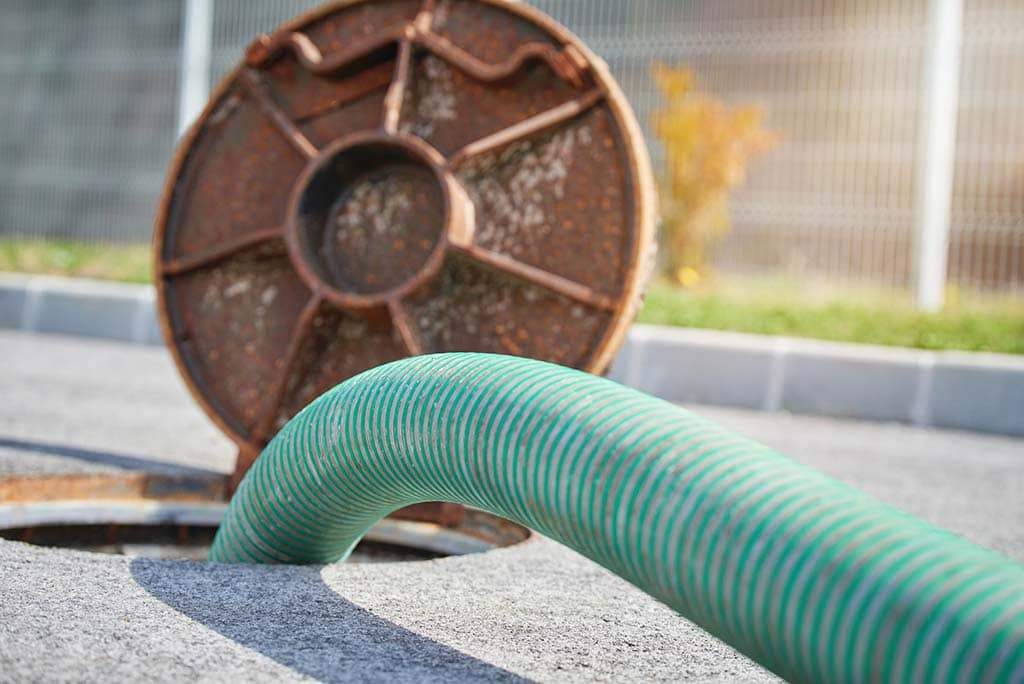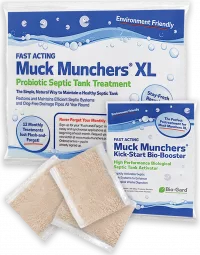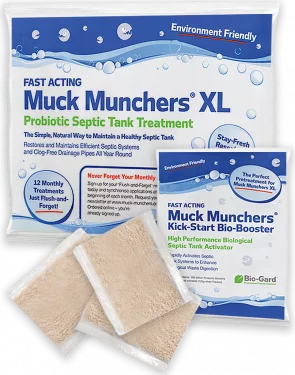5 Ways to Save Money on Septic Tank Emptying
Septic tanks do, over time, have a habit of filling up with un-digestible inorganic material if you’re not looking after your septic tank system properly.
By taking just a small amount of care you can significantly reduce the risk of spending more money than you need by reducing the frequency of septic tank emptying.

Ideally, you shouldn’t have to have your septic tank emptied more than once every four to five years. Many Muck Munchers Customers report even longer periods between empties. The whole point is this – if you don’t show your tank a little respect and treat it with care and attention, odds are that you will have to pump it out much more frequently.
There are a variety of reasons why your septic tank may need emptying and pumping out more often. Typically, flushing the wrong things can lead to sludge and scum building up in your tank, leading to it ‘filling up’ with contaminant materials more quickly.
Blocked pipes, too, can be a result of improper tank maintenance. Flushing chemicals and non-degradable waste can damage soakaways, even cause your drain field to flood. If this is the case, you need to get your tank emptied and also your soakaway drains pressure washed so that the system doesn’t fail and become a public health problem.
How Much Does it Cost to Empty A Septic Tank?
The average cost of septic tank emptying typically varies between £175 and £275 before VAT at 20%, according to UK research at Checkatrade. However, there are a few factors that bump this price up that you may not have any control over. If it’s an emergency call-out or you need additional cleaning services or soakaway pressure washing, expect to pay more. Even for a straightforward pump-out, Scottish Water’s Urgent Response charge is a minimum of £399 (or actual cost if other charges apply).
The size of your septic tank will dictate how long a septic tank emptying job is likely to take. The biggest tanks will likely take a few hours to fully empty safely, meaning you are essentially paying for the expertise as well as the labour time.
Smaller septic tanks should take less than an hour to empty, but this is still likely to cost you over £200. If you’re having to empty your tank out three times a year, that’s £600 that you could put to better use elsewhere.
It just has to make sense to manage your septic system and spend that £200 – £300 bill only once or twice a decade, instead of once or twice a year. Therefore, you need to make sure you are running your system efficiently to keep emptying costs low.
Reducing your need for septic tank emptying is actually very simple – and all it takes is practice and acquiring a few good habits.
5 Ways to Reduce the Costs of Septic Tank Emptying
While we can’t obviously speak for how much each individual tank cleaner or pumping service person will charge to empty your septic tank, the best way to avoid paying too much for these services is to avoid needing to call them in the first place.
Here are five great tips for not only saving money on septic tank emptying but also for keeping your septic system healthy and efficient for the months and years ahead.
1. Only Discharge the 3 P’s into Your Septic Tank
This is the number one rule for using any toilets connected to a septic tank system. Only ever flush the 3 Ps – pee, poo and toilet paper. Anything other than that – such as baby wipes, sanitary products, baby buds, kitchen towels – are going to be hard for your tank to digest – because they contain indigestible plastics that septic tank bacteria simply cannot digest.
That means you’re at risk of blocking your soakaway, and that the solids in your tank will just build and build without any way of natural digestion. The bacteria in your septic tank can only munch through so much!
So – think about what you flush into the tank, and your septic tank emptying won’t need to be so frequent.
2. Choose the Best Septic Tank Friendly Cleaning Products and Detergents for Your Septic System
Chemicals, too, can cause serious problems for the bacteria in your septic tank. If you are regularly flushing detergents and bleach down your sinks and toilets that are designed to kill 99.99% of all bacteria in your loo and laundry, then they can kill the bacteria in your septic tank too. You need those bacteria to stop your tank from blocking up.
It’s understandable that you are going to want to clean your drains and sanitise your toilet regularly. Therefore, consider looking for septic tank safe cleaners and detergents. There are some which, while great at killing off surface bacteria in the loo itself, won’t cause any distress to the germs in your tank. Or, at least, they won’t kill so many. Try and look for organic products where possible.
Again, this all adds up to removing the need to have your septic tank emptying out so often. If your bacteria are healthy, they will be munching up all that organic waste, converting it to water and C02 and stopping things from building up. Even the existing sludge at the bottom of the tank and those fats oils and greases flowing on the surface will be depleted, given a little time.
3. Balance Your Peak Water Usage
Believe it or not, the amount of water you use, and at what intervals, can also drive the need for you to have your septic tank emptying regularly. Consider the water you use each day. How many wash loads do you do per week? Do you ever run a bath at the same time as having the washing machine run through a big cycle?
If you use a lot of water in a short space of time, it’s going to put undue pressure on your septic tank balance. If you are having a shower upstairs and someone downstairs is doing the washing up, that’s two constant streams of water that will be overwhelming your pipes and ergo your tank. For each litre you flush into the tank a corresponding amount flows into the soakaway. Flush a massive volume in a short space of time and it can literally stir the contents and result in undigested effluent flowing into the soakaway.
Therefore, keep things in balance. We’re not suggesting that you need to reduce the number of showers you have in a week, or even how many times you do the washing up. Just be consistent with trying to use water for one job at a time. If the dishwasher’s mid-cycle, wait to have a bath once it’s complete.
4. Take Care of Your Soakaway
Soakaways are crucial elements in septic systems, but if blocked and/or overloaded, they can soon cause flooding, or cause your tank to start backing up too. In either case, you may need to call out a professional for septic tank emptying. Thanks are easily cleaned – damaged soakaways are both difficult and potentially very expensive if they need replacing.
Taking care of a soakaway is much like taking care of a septic tank. You just need to consider the points made above. Be careful on how much wastewater you pump into your tank at once, use mild low phosphate detergents, non-chlorine septic-safe cleaners and sanitisers – and stick to the 3 Ps.
5. Keep Your Tank Topped Up With Healthy Bacteria
If you’re doing all of the above, that is great news. It is now time to think about keeping the bacteria in your septic tank topped-up and healthy. But how?
Muck Munchers are microbes specially formulated to help eat through organic waste and debris in your septic tank and to help keep things moving. Even if you are not already flushing more than the 3 Ps, and are using septic-safe cleaners and sanitisers, you can always do with more help when it comes to getting your tank waste down to healthy levels and protecting your soakaway.
Muck Munchers are formulated to be used regularly and to keep your septic sludge and scum levels in check. While great septic tank maintenance will always ensure that there are bacteria in place to keep levels low, you could always do with a little help, because however carefully we are, modern living does place massive demands upon septic systems.
When it comes to economics, breaking down solids and waste with Muck Munchers is considerably cheaper than frequently emptying your septic tank out. You’ll see the savings pretty quickly – you’ll find you only need to empty your tank every few years, rather than every few months or each year. It all comes down to a healthy septic system, with the peace of mind that Muck Munchers brings plus savings of £100’s on significantly reducing septic tank emptying.










